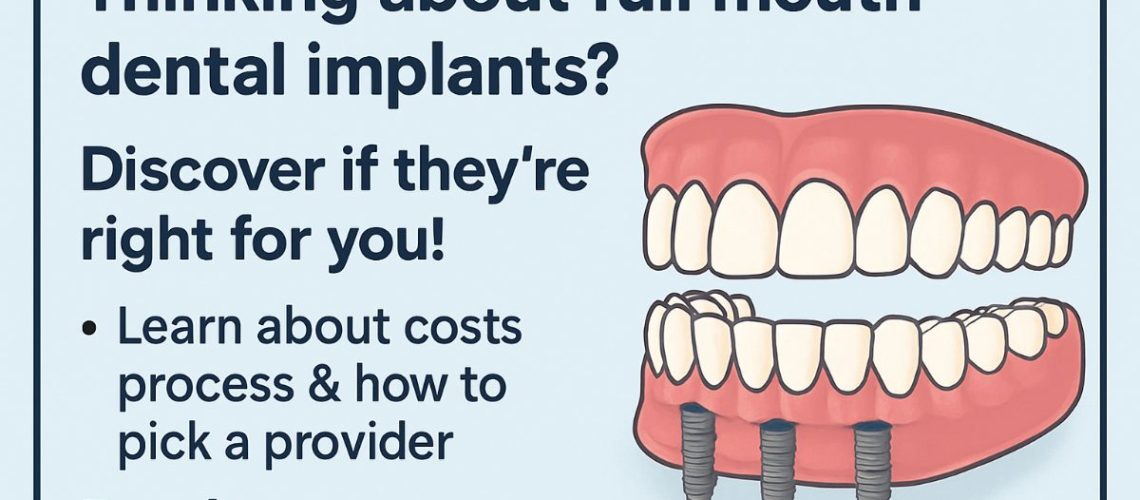Thinking about whether full mouth dental implants near you are worth it? This article explains what people mean when they search for full dental implants nearby, and gives honest pros, cons, typical costs, and clear next steps. Read on to learn who is a good candidate, what the treatment looks like day by day, how long implants last, possible risks, and how to choose a provider so you can decide if full-arch implants are the right choice for you.
Who is a good candidate for full dental implants?
Oral health and bone
Successful implants need healthy gums and enough jawbone to hold the implants. If you have bone loss from missing teeth or gum disease, you might need a bone graft or sinus lift first. After grafting, healing can take several months before implants are placed. Your dentist will use 3D scans to measure bone volume and plan the best implant positions.
Medical and lifestyle factors
Medical conditions and habits matter. Well-controlled diabetes usually isn’t a deal-breaker, but uncontrolled diabetes raises the risk of complications. Smoking slows healing and increases implant failure rates. Certain medications (like some bisphosphonates) can affect bone healing. Age by itself is not a barrier — candidacy depends on overall health, not just years lived.
Patient goals and expectations
Think about what you want from treatment. Full-arch implants restore chewing, speech, and appearance more like natural teeth than dentures. But they require surgery and several months of healing in many cases. If you need a fast cosmetic fix with no surgery, implants may not match your goals. Be honest about your tolerance for surgery, follow-up visits, and temporary diet limits during recovery.
What the treatment process looks like
Consultation and 3D imaging
First, you’ll have a consult with exams, photos, and a CBCT 3D scan. The scan shows bone, nerves, and sinuses so the team can plan precise implant locations. Ask to see a digital plan and sample prosthetics. Good questions: How many implants do I need? Do I need grafting or extractions? What will the recovery be like?
The surgery day (single-day full-arch option)
Many practices offer single-day full-arch restorations: implants are placed and a provisional bridge is attached the same day. You’ll get local anesthesia plus IV sedation or general anesthesia, depending on the plan. The provisional lets you leave with teeth that look and function while the implants integrate with bone over the next months.
Recovery and follow-up
Expect moderate swelling and soreness for a few days. Pain is usually managed with prescription or over-the-counter meds. A soft or blended diet is common for the first 1–2 weeks. Follow-up visits check healing and adjust the provisional prosthesis. After 3–6 months of integration, your permanent bridge or zirconia prosthetic is delivered.
Costs, longevity, and value — are full dental implants near me worth it?
Upfront cost vs long-term value
Full-arch implants cost more upfront than removable dentures, but they last longer and preserve jawbone. Well-made implant bridges often last 15–25+ years with good care, while dentures usually need replacement or relining every few years. Over time, implants can be more cost-effective when you count fewer replacements and better oral health.
Factors that change value
Price depends on how many implants are used, whether bone grafting or extractions are required, materials (acrylic vs. high-strength zirconia), lab fees, and provider experience. Single-day solutions with in-house labs and digital workflows can reduce some costs and shorten treatment time.
Risks, downsides, and when implants might not be the best choice
Possible complications
Complications are uncommon but can include infection, implant failure if integration fails, nerve irritation causing numbness or tingling, and sinus problems with upper jaw implants. Choosing an experienced surgical team and following post-op instructions lowers these risks.
When to consider alternatives
Removable dentures or implant-supported overdentures may be better if medical risks, very limited budget, or preference for less invasive care are priorities. Bridges can work when only a few teeth need replacement and bone is healthy. Discuss trade-offs with your provider to match treatment to your life and finances.
How to pick the right provider for full dental implants near me
Credentials and experience
Choose surgeons with hospital residencies and board certification in oral and maxillofacial surgery when possible. Full-arch experience matters — ask how many full-mouth cases the team has performed and request before-and-after photos of similar patients.
Technology and in-house capabilities
Look for practices that use CBCT scans, digital planning, dynamic surgical guidance, and an in-house lab. These tools improve precision and speed, and on-site fabrication means faster provisional and final restorations. Sedation options and PRF or grafting tools are pluses for predictable healing.
Patient support and transparent pricing
Good providers offer clear fee breakdowns, financing plans, coordinated care with your dentist, and robust follow-up. Read reviews and ask for references from patients who had full-arch work.
Example practice to consider
For people searching for full mouth dental implants near me in Dallas–Fort Worth, practices like Texas Center for Oral Surgery & Dental Implants provide board-certified oral surgeons, 3D planning, single-day full-arch restorations, and an on-site digital lab—options that can improve speed, fit, and predictability.
Next steps
Bring any recent X-rays, a list of medications, and your questions to the consult. Key questions: Am I a candidate? How many implants will I need? What are total costs and payment options? What is the timeline from surgery to final teeth? If you’re ready to learn whether full mouth dental implants near me in Dallas–Fort Worth are right for you, schedule an evaluation with a board-certified oral surgeon who offers 3D imaging and single-day full-arch options.

